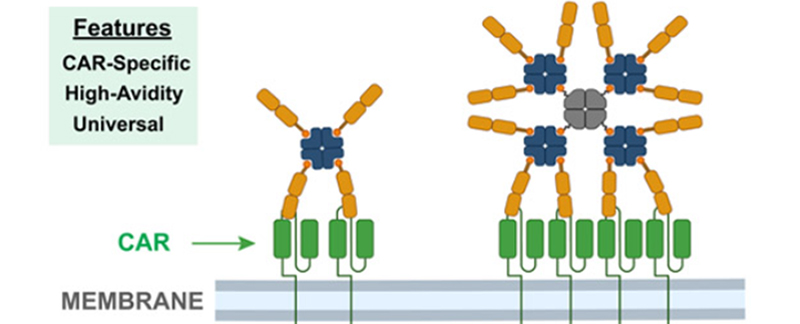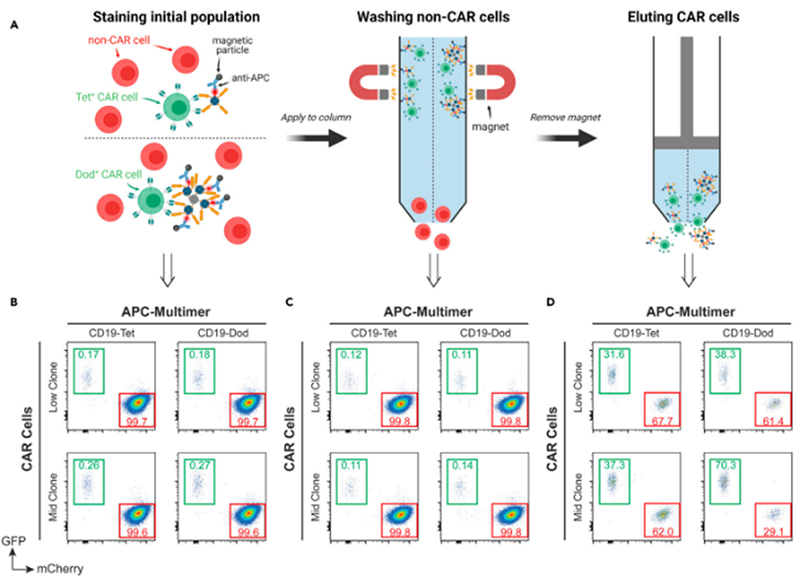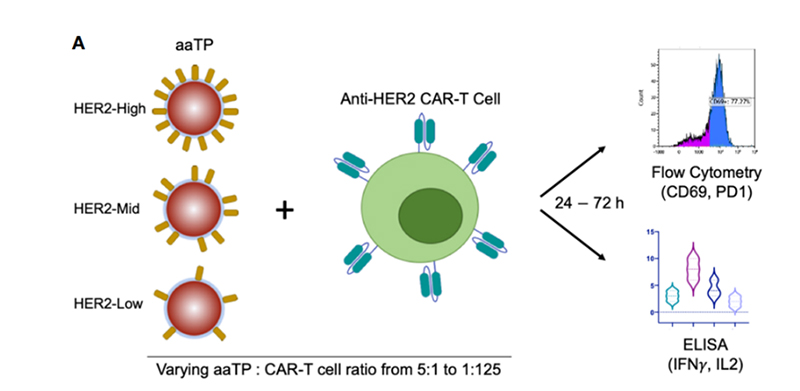 Request a FREE Sample of our FcRn Binding Kit!
Request a FREE Sample of our FcRn Binding Kit! Request a FREE Sample of our FcRn Binding Kit!
Request a FREE Sample of our FcRn Binding Kit!
 Limited Edition Golden Llama is here! Check out how you can get one.
Limited Edition Golden Llama is here! Check out how you can get one.  Limited Edition Golden Llama is here! Check out how you can get one.
Limited Edition Golden Llama is here! Check out how you can get one.
 Request a FREE sample of our GMP products!
Request a FREE sample of our GMP products!  Request a FREE sample of our GMP products!
Request a FREE sample of our GMP products!
> Insights > A Promising Approach for Improving CAR Cell Activation, Expansion, Enrichment, and In Vitro Analysis

Engineering immune cells has emerged as the forefront of cancer treatment, particularly with Chimeric Antigen Receptor T-cell (CAR-T) therapy, demonstrating remarkable efficacy in the treatment of relapsed or refractory hematological malignancies. Given that CAR cells are 'living drugs,' their manufacturing process is complex and demands stringent quality control. As CAR-T continue to grow as a promising therapeutic, there is an urgent need for CAR cell-related reagents and tools to emphasize and improve scalability and workflow automation. One such example is the use of antigen multimers, due to their high specificity and accuracy, for CAR cell activation, expansion, detection, enrichment, and ex vivo analysis. Pre-coupled magnetic multimers targeting specific antigens demonstrate distinct advantages in various applications.

Figure 1. Schematic Diagram of Antigen Tetramer and Antigen Pre-Coupled Magnetic beads based on the SA-Biotin system. Matter. 2021;4(12):3917-3940
The activation and expansion of T cells is a crucial step in manufacturing CAR-T cell therapies. Conventional approaches involve the use of anti-CD3/CD28 T cell activation beads or anti-CD3/CD28 antibodies. However, these activation agents uniformly stimulate all T cells during the expansion process following lentiviral transduction. This non-specific stimulation leads to a diminished proportion of therapeutically potent CAR-T cells post-expansion, resulting in suboptimal outcomes and low efficacies upon patient infusion.
Emerging research has highlighted alternative activation methods, notably employing CD19 tetramers or CD19 dodecamers coupled to magnetic beads. Incubation of anti-CD19 CAR cells with these multimeric structures at physiological temperature (37°C) induces notable upregulation of T cell activation markers such as CD69 and CD25. Moreover, the concentration-dependent response observed indicates that higher concentrations of multimers correlate with increased percentages of activated CD69+ and CD25+ cells, accompanied by increased secretion of IL-2, an important cytokine in T cell activation. Comparative analyses further reveal that antigen-coupled magnetic beads outperform antigen tetramers in efficacy. This suggests that the utilization of magnetic bead-coupled antigen multimers provides higher potency in activating CAR-T cells, owing to their superior binding affinity.

Figure 2. Activation of CAR-T cell by pre-couple target antigens with magnetic beads. Matter. 2021;4(12):3917-3940
Enriching CAR cells is a standard procedure in the development of cell therapy drugs, especially when dealing with low-level CAR expression (low to intermediate abundance). Utilizing specific antigen-coupled magnetic beads is a promising strategy for CAR-T cell enrichment. Studies have shown that approximately 35% and 55% of low-clone and mid-clone CAR cells, respectively, are retained on the column based on the flow-through rate of CAR cells after activation. Following negative selection, the ratio of CAR cells eluted from the column surpasses the original cell population by over 100-fold, with significantly higher fluorescence intensity in the eluted cells compared to the initially stained population. Interestingly, magnetic bead-mediated dodecamers demonstrate superior cell enrichment efficiency compared to tetramers, likely due to the higher fluorescence generated upon dodecamer staining. These findings underscore the potential of multimeric specific target beads for enriching rare CAR-T cells exhibiting low CAR expression.

Using specific antigen-coupled magnetic beads for CAR-T cell enrichment. Matter. 2021;4(12):3917-3940.
Comprehensive ex vivo analyses of CAR-T cells for each manufacturing step such as T cell activation, expansion, and cytokine release is crucial when establishing robust testing criteria for product release. Most ex vivo assays rely on co-culturing CAR-T cells with cancer cell lines expressing the target antigen. However, using cancer cell lines comes with a major limitation: the antigen density expressed by these cells is often heterogeneous and unstable, making it challenging to control. Moreover, the activation of CAR-T cells largely depends on the level of antigen expression on tumor cells surfaces, posing challenges in establishing standardized analytical methods. Additionally, as the number of target cells changes during the analysis (proliferation or cell death), it becomes difficult to precisely evaluate CAR-T cell function based on antigen dose (e.g., cytokine secretion, Effector:Target ratio). Furthermore, each cell line model has its own genetic and epigenetic backgrounds, potentially introducing unknown cell line-specific factors that could hinder standardization of analysis methods.
In response to these challenges, researchers are beginning to use target specific pre-coupled magnetic beads. This approach offers distinct advantages over traditional cell lines, allowing precise modulation of antigen density on magnetic bead surfaces. Following co-incubation with CAR-T cells, analytical techniques such as flow cytometry and ELISA enable quantification of key parameters, including CAR-T cell antigen specificity and dose-dependent activation.
By circumventing the limitations associated with conventional approaches, this shift towards alternative methods facilitates the development of refined and standardized ex vivo assays for CAR-T cells. Through enhanced experimental control, reduced costs, and precise quantification, these innovative strategies hold promise for enabling more precise characterization and evaluation of CAR cell therapies during preclinical development prior to clinical stage.

Schematic diagram illustrating in vitro analyses following co-incubation of anti-HER2 CAR-T cells with magnetic beads coated with varying densities of HER2 antigens. Front Immunol. 2022 Oct 20;13:994532.
ActiveMax® is our specialized brand designed to facilitate cell activation, culture, and various other application scenarios crucial for immune cell therapy research and preclinical process development. This comprehensive range comprises Target-specific Activation Beads, GMP-grade Anti-CD3/CD28 Antibody-coupled Magnetic Beads, and sterile cell culture grade Streptavidin-coupled Magnetic Beads that give customers flexibility in target conjugation. Manufactured with stringent quality standards by ACROBiosystems, our ActiveMax® products are guaranteed to be animal origin-free, sterile, mycoplasma-free, and ultra-low in endotoxins. This ensures that our offerings fulfill all your requirements, supporting seamless progression from immune cell therapy related research to preclinical development.
This web search service is supported by Google Inc.
